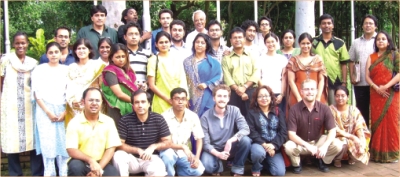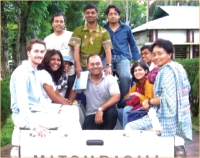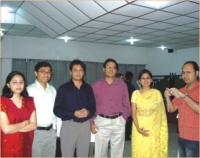|
Campus Feature
Where sky touches the curved sphere
Shamim Ahmed
Last time when I wrote a small article the editor of Star Campus expressed interest about the James P Grant School of Public Health. He thought it would be great to print the thoughts and experiences of the students here. That's why I decided to write this article. Diana Nelson, one of my colleagues here helped me to arrange the information.
 Public health may still not be a very common subject in Bangladesh; however, the policy makers always felt the need of having a public health school, which would be equipped with modern classroom and library facilities, as well as have national and international students and faculties. And what could be better than having collaboration with universities like Harvard, Columbia, London School of Medicine and Tropical Hygiene? Chairperson of the biggest NGO of the world, Mr. Fazle Hasan Abed has made this dream a reality. The school has been named after former Executive Director of UNICEF James P Grant, who had a remarkable contribution in improving the health of poor people all over the world. James P Grant School of Public Health at BRAC University is been considered one of the best public health schools in the world and the students are ready to face the challenges of the future, as echoed by Tanzee (Bangladesh). She says: " If we can afford to learn public health issues then a fortiori we can afford to pay back to the poor people of the world. We are an example of the abstract art of public health professionals”. Public health may still not be a very common subject in Bangladesh; however, the policy makers always felt the need of having a public health school, which would be equipped with modern classroom and library facilities, as well as have national and international students and faculties. And what could be better than having collaboration with universities like Harvard, Columbia, London School of Medicine and Tropical Hygiene? Chairperson of the biggest NGO of the world, Mr. Fazle Hasan Abed has made this dream a reality. The school has been named after former Executive Director of UNICEF James P Grant, who had a remarkable contribution in improving the health of poor people all over the world. James P Grant School of Public Health at BRAC University is been considered one of the best public health schools in the world and the students are ready to face the challenges of the future, as echoed by Tanzee (Bangladesh). She says: " If we can afford to learn public health issues then a fortiori we can afford to pay back to the poor people of the world. We are an example of the abstract art of public health professionals”.
The first batch of students is already rocking the job market. First batch student and now a research assistant of BRAC, Shuvra says, “I as a first batch student certainly see the school growing, not only in terms of the growing number of students but also the expressions that accrue with that. It's just like a baby the number of synapses in whose brain just increases with every stimulus from the surrounding environment. Eventually the school will grow to be a fully matured 'Adult'”.
 The second batch of MPH is currently going on with 14 national and 12 international students of different backgrounds coming from 11 different countries. Priya (India) speaks up on the diversity issue, “Being Indian, I am amazed by similarity of our cultures, distinct closeness of my mother tongue Marathi with Bengali, may be because both came from Sanskrit, almost similar food patterns, beautiful sarees… We could be a part of Language Martyr's Day observation and also Pahela Boishakh celebration and these memories will be treasured forever. Tell me, where in the world will you get to see India, Pakistan, Afghanistan, Bangladesh, United states all living under one roof without war or suffering?...well this happens here, in our Savar campus”. The second batch of MPH is currently going on with 14 national and 12 international students of different backgrounds coming from 11 different countries. Priya (India) speaks up on the diversity issue, “Being Indian, I am amazed by similarity of our cultures, distinct closeness of my mother tongue Marathi with Bengali, may be because both came from Sanskrit, almost similar food patterns, beautiful sarees… We could be a part of Language Martyr's Day observation and also Pahela Boishakh celebration and these memories will be treasured forever. Tell me, where in the world will you get to see India, Pakistan, Afghanistan, Bangladesh, United states all living under one roof without war or suffering?...well this happens here, in our Savar campus”.
Bethuel from Kenya observes: "I am certain that I will be able to use the knowledge gained here in my own country to change the lives of African people by improving their quality of life through better health.”
BRAC University and the International Center for Diarrhoeal Diseases and Research, Bangladesh (ICDDR) initiated James P. Grant School of Public Health in collaboration with Columbia University, USA in 2005. The school offers Masters in Public Health (MPH) and one year intensive multiple disciplinary courses.
Shershah (Afghanistan) verifies the importance of partnership, “More than 30 years of experience of BRAC in the field of health, collaboration with recognized schools of public health in the developed world, particularly partnership with ICDDRB the excellent center for health researches are the unique advantages of this school which are hardly possible to be seen in other schools of public health in the world.”
 Some of the characteristics that make this school a cut above the rest, not only in Bangladesh but also compared to many Western schools of public health, are the course contents, the faculty from renowned universities of the world (Harvard, Boston, Johns Hopkins, Columbia to name a few) and the students. Ilias (Bangladesh) agrees: “As the faculties are from prominent universities, quality of teaching here is unquestionable. It's the opening of a new horizon for me”. Nepalese student Amit says, “The featuring of the school in the latest World Health Report is a testimony of its success. The enrollment of students from four different continents including North America clearly signals that the trend is changing. Students are keener to learn things closer to real-life than just stay limited within academic boundaries. Three cheers to the school.” Alex (Canada) adds more, “During my six months in Bangladesh I've been highly impressed by the quality of the teaching, the intelligence and motivation of the student body and the field trips that have given me a first-hand perspective on the subjects I'm learning about. I know the experiences I have here in Bangladesh will be foremost on my mind when I make public health decisions in the future.” Some of the characteristics that make this school a cut above the rest, not only in Bangladesh but also compared to many Western schools of public health, are the course contents, the faculty from renowned universities of the world (Harvard, Boston, Johns Hopkins, Columbia to name a few) and the students. Ilias (Bangladesh) agrees: “As the faculties are from prominent universities, quality of teaching here is unquestionable. It's the opening of a new horizon for me”. Nepalese student Amit says, “The featuring of the school in the latest World Health Report is a testimony of its success. The enrollment of students from four different continents including North America clearly signals that the trend is changing. Students are keener to learn things closer to real-life than just stay limited within academic boundaries. Three cheers to the school.” Alex (Canada) adds more, “During my six months in Bangladesh I've been highly impressed by the quality of the teaching, the intelligence and motivation of the student body and the field trips that have given me a first-hand perspective on the subjects I'm learning about. I know the experiences I have here in Bangladesh will be foremost on my mind when I make public health decisions in the future.”
It's also a new experience for the south Asian students to have friends and teachers from all over the world. While Sharifa (Bangladesh) highlights, “A very different dimension of teacher-student relationship in comparison to what exists in our country”, Nang Mo (Myanmar) signifies the reality of friendship, “One thing that I will never forget is my friends- who care about me, understand me and always welcome me to share my joys and sorrows”.
The school is matriculating the best of the best and most of them are getting scholarship worth 19,000 US dollars! Aziz (Bangladesh) says, “When the question of tuition fee waiver worth about USD 19,000 comes, it will allure anyone. What I have learnt in the meantime from the course, friends and working environment here, definitely changes me a lot compared to what I was a year back.”
Staying away from home and living with the pressure of studies needs bond among friends. “JPGSPH is the place where I came to know that my teachers can actually dance with me, buy flowers on my birthday, joke when they are teaching or even ask me where I bought my new Kurta from. This school made it possible for me to taste life and culture from eleven countries and I didn't even have to leave Bangladesh. It's immense fun,” says Farah (Bangladesh). Ramiro (Bolivia) adds, “I think I am reaching my academic objectives and building friendship, learning about new cultures and finding answers to my life itself.”
A well decorated 24 hours open computer lab gives the students the chance to stay updated with the rest of the world. Bihith (Bangladesh) who spends a lot of his off time in the lab says, “Whenever I feel bored with the science of public health, I relish studying how differing ideas and cultures confluence finally making our life 'unity in diversity' and make the dorm a living lab to refresh my micro-sociology.”
BRAC launched JPGSPH with the mission of “improving health outcomes in populations in disadvantaged areas of the world, particularly low income women and children, through the application of the art and science of public health.” Noah (USA), founder president of Kolkata Kids Inc., a US based not-for-profit organization committed to the health care needs of children in and around Kolkata says, “The school places great emphasis on experiential learning, utilizing as prime examples the public health problems of Bangladesh. It is a real honor to have been chosen to participate in this program. While it's difficult to be away from the day-to-day activities of Kolkata Kids, what I am learning here is going to be extremely beneficial to our work in Kolkata”. While asked about his experience in this school, Jawaid (USA) painted it as a beautiful picture of eternity, “I've tried to record my experience here in Bangladesh in short clips. In my mind there are photos of village children swinging from trees, men gathered in tea shops playing cards under candlelight, cows grazing on the fertile land and rickshaw pullers resting near a breezy cliff after a days work. These are daily images, but for a foreigner these sights are the moments of acculturation. Like the colours in the sky during a Bangladeshi sunset, these images will settle together, and give birth to new ideas, new questions, newer ways of thinking. These will be the images of my education at James P. Grant School of Public Health.”
[To know more about the school log in to http://www.bracuniversity.ac.bd/I&S/sph/ or contact the writer: shamim.aj@gmail.com ]
Copyright
(R) thedailystar.net 2006 |
